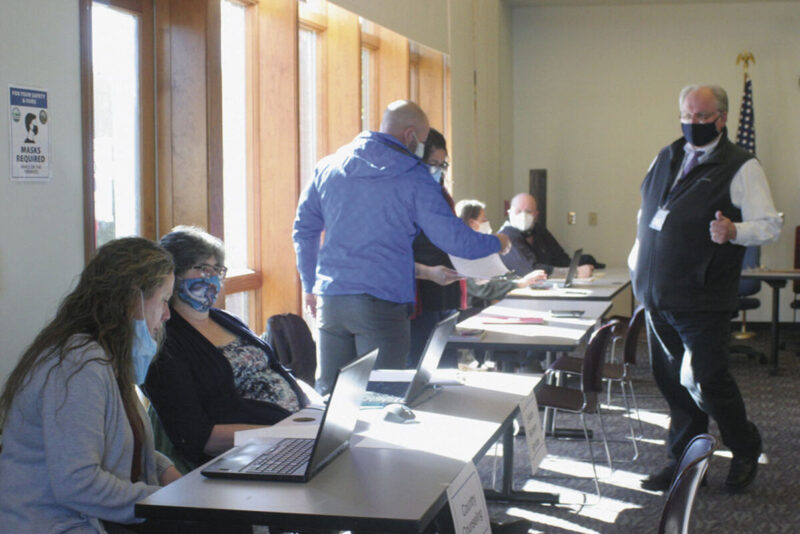Kelly Kenoyer
Editor’s note: This is one in an occasional series of stories dealing with the challenges facing the unhoused in our community.
At noon Wednesday, Oct. 28, a veritable crowd of helpers gathered in the Municipal Court, ready to greet the downtrodden and get them back on their feet.
Community Court, as it’s dubbed, provides help to low-level offenders who are struggling with addiction, housing, mental health problems, or employment. Participants are directed to programs that will lift them up instead of shunting them into jail or giving them fines they can rarely repay.
“You can’t fine someone into not being homeless anymore,” Judge Larry Blake said.
Indeed, many low-level crimes can be mitigated by services like temporary housing. A recent analysis by The Oregonian newspaper found that 87% of homeless people arrested in 2016 in Portland were arrested and booked in jail again within three years. By comparison, only 2% of those booked in jail per year from 2016-19 lived in temporary housing that offered connections to services, according to the report.
The community court aims to fight crime with services rather than punishment. When clients arrive, they’re immediately offered snacks and a mask on a table at the entry. A court clerk helps direct them to the judge or to their assigned advocate, and then they’re bustled around the room to various agencies.
Community Service Officer Sean Morgan works closely with the homeless population in Sweet Home, and said he often helps choose which offenders go to community court.
“Someone who just needs help to change, to help to make life better, to get stabilized,” he said. “People who are stable, they’re not gonna be committing these types of crimes.”
One new client came to the judge full of tension, but Blake started telling the newcomer how the community court would arrange for services and then dismiss the charges.
The tension slowly started melting from the client’s shoulders, who ended up thanking the judge for the opportunity. The clients typically come to the court because of lifestyle charges, like second-degree theft, disorderly conduct and criminal trespass.
During a court session, total of 15 service providers are arrayed around the room, offering primary medical care, mental health care, addiction treatment, housing, and even transportation. Multiple agencies offer to get clients on the Oregon Health Plan.
One unique innovation is the “peer support” person who guides each client through the system. They’re assigned almost immediately and help get an assessment for the client.
Amelia Wyckhuyse is a peer support from CHANCE, or Communities Helping Addicts Negotiate Change Effectively. As a former homeless addict herself, she understands exactly where her clients are at when they get pulled into the court system, she said.
Wyckhuyse said her job is “helping them to identify what their strengths and resources are and helping them identify what they need.”
She starts by asking her newly assigned clients to tell her their story, and then she tries to match their needs to resources she knows about.
“Knowing what I know, I’m like a walking resource guide,” she said, adding she can “help get some of their basic needs met so they can get some stability.”
Wyckhuyse’s experience as a meth addict seven years ago means she knows what her clients are experiencing, both in terms of homelessness and the court system.
“I have a history of having criminal justice involvement, so I have a unique perspective and understand what it’s like to go through the whole continuum process of the criminal justice system from being detained, arrested, taken to jail, put on probation, and getting through that process, and then not being on supervision anymore.”
She uses those memories and her training and understanding to help her clients meet with the other organizations scattered across the room.
She might find out her client is homeless, and set them up with Community Services Consortium to help them get housing. She might learn about a client’s mental health problems, and get them enrolled in the Oregon Health Plan so they can get counseling and medication. She might learn about their struggles with addiction, and help them join group therapy.
“It’s super duper important to be able to be comfortable with sharing your story, but being comfortable with recognizing that you’re a role model, and that you want to live a life that other people want,” Wyckhuyse said.
Kevin Ort, a clinical supervisor at Linn County Alcohol and Drug, said he often meets clients who are dealing with addiction and gives them an appointment to come to the Lebanon or Albany office, where they can meet with a psychologist to get prescriptions to deal with any mental health conditions they may have. Then a peer supporter will drive them there.
“A lot of people we see in this court don’t typically follow through,” he said. “That’s why the peer mentors are a big piece.”
Jon Phelps, who also works with CHANCE, said the peer supports may stick with the clients as long as they want help.
“If they get on OHP we can help them as long as they want.”
Community Court in Sweet Home is only in its second month, and clients are required to come back for six months before they can have their cases dismissed. But Judge Blake said he’s seen some good signs already. For one, seven out of the ten original clients came back for the second month, as required, and many of them were thankful for the opportunity. There’s also been growth, with six new clients in the second month.
“Well, if people engage in it, it’s been really useful,” he said. “We’ve had a lot of people come up and say, first of all, they’re surprised that they have the court. And secondly, they’re very thankful that the court is offering services, rather than the trauma, we had some really very grateful people, plus some people with some pretty significant issues.”
The clients are picked when they come into municipal court, but Blake said he listens to police officers for referrals as well.
“The criteria that we look for are any people with mental health issues, any people who have housing issues, and any people with alcohol and drug issues,” Blake said. “Generally, police officers know pretty well who would be served by the process.”
It will be another four months before it becomes more evident whether the court has been a success: it takes six months for any clients to graduate. But one client came back to the judge before court ended in October, and the peer mentor ticked off a list of five services the client had successfully accessed since the last community court.
Judge Blake was grinning.





